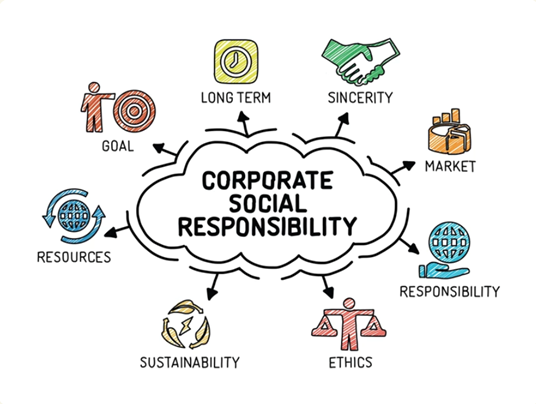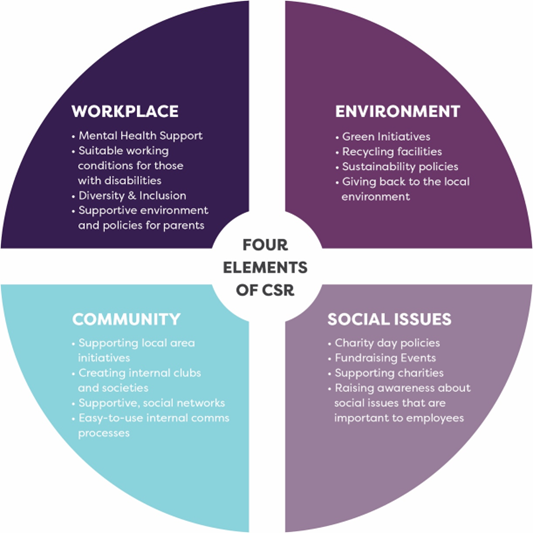Social Responsibility: Why it matters and how it can make a difference
Social responsibility is a concept that has gained immense importance and popularity in recent years in businesses and companies. Being socially responsible means taking responsibility for the impact and actions businesses have (or can have) on society and the environment. In other words, companies should give something back. And it would help to thrive not only businesses but customers and the community too.
The concept of social responsibility appeared in the early 20th century when companies began to realize the impact of their actions on society. Today, social responsibility is more important than ever, as businesses and individuals face growing pressure to take action on issues such as climate change, inequality, and social injustice.
In this article, we will explore the concept of social responsibility in-depth, looking at why it matters, how it can make a difference, and what steps businesses and individuals can take to become more socially responsible.

(Source: https://www.thegivingmachine.co.uk/blog/posts/corporate-social-responsibility-a-simple-guide/)
What is social responsibility?
Social responsibility is the idea that individuals and organizations would better act in the best interests of society and the environment than just creating profit. That can include reducing environmental impact, promoting social justice, and supporting local communities. The action plan is individual for each company. Every business decides on its own what is comfortable for them to do.
For many people, social responsibility term means taking care of the environment. It is a big part of the whole concept but not only that. Social responsibility includes a range of issues businesses can influence – from human rights and equality to sustainable development and protection of the environment. But overall, it can be divided into three main areas: economic, social, and environmental.
Economic-social responsibility refers to the obligation of businesses to act in the best interests of their stakeholders, including shareholders, customers, and employees. Companies obviously care about the resources and benefits for everyone. Economic-social responsibility is an obligation for a company to promote growth and stability.
Social or ethical social responsibility refers to the obligation of businesses to act in the best interests of society, including issues such as poverty, education, health, and other aspects, even beyond the particular laws protecting employees. Being ethical for a company means paying adequate salaries to everyone employed and offering jobs to those who might struggle to find one. The fairest deal possible is the common goal for an employee and a socially responsible employer. An example of taking care of employees could be found in IT companies before COVID hit the planet. IT giants provided (some of them still do) their workers with everything they wanted and needed – from big salaries, sports cards, and restaurants with Michelin chefs to bedrooms to take a nap during a long day at work. Although it is very controversial because companies made people stay longer at work, who would not like having the best lunch every day? Today the best working conditions are flexible hours and a home office where an employee can decide when they want to start working.
Environmental-social responsibility refers to the obligation of businesses to act in the best interests of the environment, addressing problems such as climate change, pollution, and resource depletion. Issues once considered unavoidable, such as a carbon footprint, now are the targets to reduce/eliminate in many companies. Some of them are obliged to act in line with the interests of the environment by law, while some businesses are doing that because it is necessary for saving the environment.
Social responsibility may be referred to as a readiness of a company/business to pay extra costs for something that wouldn’t bring benefit immediately, however, that would create a better environment outside and inside the office as well – happy employees willing to do the job because their work is noticed and appreciated by equal pay or additional benefits.
Why does social responsibility matter?
There are many reasons why social responsibility matters. For one, it is simply the right and moral thing to do. As members of society, we all have a responsibility to contribute to the common good. By acting in the best interests of society and the environment, we can help to create a more just and sustainable world for future generations.
Another reason is that social responsibility can positively influence the bottom line, the overall impact of actions on both financial and non-financial aspects, including the well-being of people and the environment. Studies have shown that consumers are more likely to support socially responsible businesses. Moreover, socially-responsible companies tend to perform better over the long term. Social responsibility can help build trust and loyalty among customers. That can lead to increased sales and profits.

(Source: https://www.spectrum.life/blog/corporate-social-responsibility-and-employee-wellbeing/)
How can social responsibility make a difference?
Social responsibility can make a difference in many ways. First, it can help to promote social justice and equality. By taking steps to support marginalized communities and address issues such as poverty and inequality, businesses and individuals can help to create a more just and equitable society.
Second, social responsibility can help to protect the environment. By taking steps to reduce environmental impact and promote sustainability, businesses and individuals can help to ensure that future generations have access to the resources they need to thrive.
Third, social responsibility can help to build trust and loyalty among customers and stakeholders. By demonstrating a commitment to social responsibility, businesses can create a positive reputation and earn the trust and loyalty of customers, employees, and investors.
Finally, social responsibility can help to drive innovation and creativity. By taking on the challenge of being socially and environmentally responsible, businesses and individuals can tap into new sources of innovation and creativity, leading to new products, services, and business models that can create value.
How can you have an idea if a company is socially responsible?
The best way is to research what people say about its owner, rules, and benefits.
Usually, companies have websites or social media where they post information about themselves, their goals, and their actions. If a business doesn’t even have such information, that should be considered a red flag. Today, not only entrepreneurs must be socially responsible (including all the areas it can cover), but also employees and customers. Creating a better world is a task for the whole society.
Victoria Zueva








